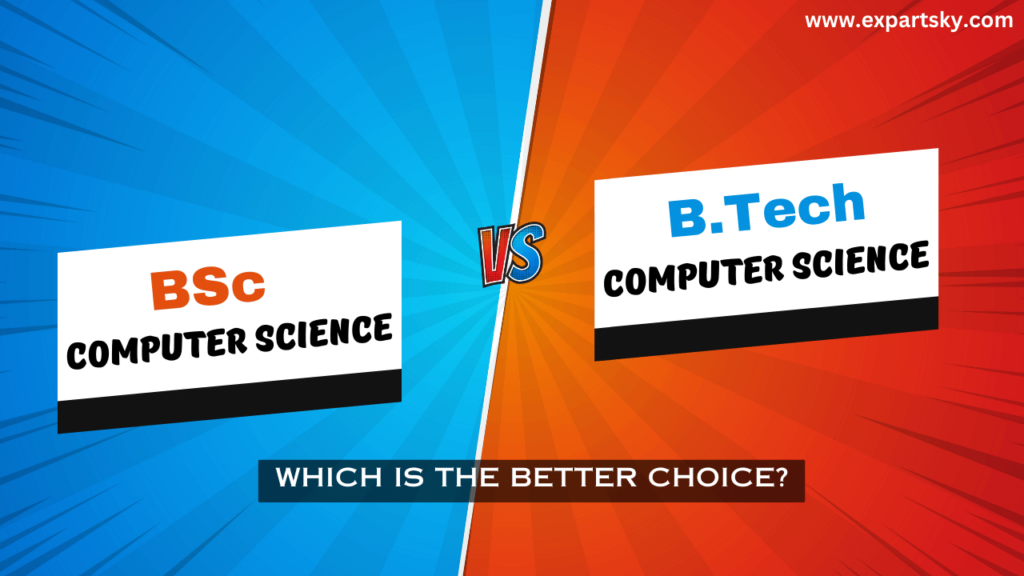Today, when it comes to making a career in the ever-evolving field of computer science, choosing between BSc Computer Science (BSc CS) and BTech Computer Science (BTech CS) can be quite challenging. Both degree programs offer promising career opportunities, but they come with differences in terms of curriculum, depth, and potential salary prospects. This blog aims to provide a detailed comparison of BSc CS vs BTech CS, examining aspects such as curriculum, salary, career options, and overall scope.

What is the Difference Between BSc CS and BTech CS?
BSc Computer Science (BSc CS)
- Duration: Typically 3 years.
- Focus:Today many times the Bachelor of Science in Computer Science focuses mainly on the fundamental concepts of computing, programming languages, algorithms, data structures, and computer systems. It is more theory-driven and lays the groundwork for further study or entry-level jobs in the IT field.
- Specializations: Some BSc programs may offer electives in areas such as Artificial Intelligence, Database Management, Web Development, etc.
BTech Computer Science (BTech CS)
- Duration: Typically 4 years.
- Focus: A Bachelor of Technology in Computer Science is a more engineering-oriented degree that blends technical skills with practical applications. BTech CS programs dive deeper into subjects like computer architecture, software engineering, machine learning, networking, and cybersecurity. It provides a more hands-on, industry-relevant curriculum designed to prepare students for technical roles in large-scale software and hardware companies.
- Specializations: BTech students may also specialize in areas like data science, artificial intelligence, robotics, cloud computing, and more.
In terms of curriculum, BTech CS tends to be more comprehensive, involving advanced subjects and practical projects that are directly applicable to current industry demands. BSc CS, on the other hand, is more focused on fundamental concepts and theoretical knowledge.
BSc CS vs BTech CS Salary: Which Offers Better Career Prospects?
When it comes to salary, BTech Computer Science typically offers higher earning potential than BSc Computer Science.
- BSc Computer Science Salary: Fresh graduates with a BSc CS degree can expect to earn around ₹3-5 lakhs per annum in India. The salary can vary depending on the company, location, and individual skills. Entry-level roles might include software developer, IT support specialist, or data analyst.
- BTech Computer Science Salary: On the other hand, a BTech CS graduate can expect to earn anywhere between ₹5-10 lakhs per annum at the entry level, with potential for much higher salaries as experience increases. Roles for BTech graduates include software engineer, system architect, cloud engineer, and network security specialist.
It’s important to note that salary prospects also depend on factors such as work experience, skills, industry certifications, and geographical location.
BSc vs BTech: Which is the Better Choice for You?
Choosing between BSc CS and BTech CS boils down to your career aspirations and learning preferences. Here’s a quick breakdown:
Why Choose BSc Computer Science?
- Shorter Duration: If you are looking for a quicker entry into the workforce, a BSc CS is a good choice, as it takes only 3 years to complete.
- Theoretical Focus: If you prefer a more academic approach to learning and wish to continue your studies with an MSc or pursue a research-based career, BSc CS might be better suited for you.
- Flexibility: With a BSc CS, you can later switch to related fields like data science or information technology by pursuing certifications or a master’s degree.
Why Choose BTech Computer Science?
- Comprehensive Curriculum: BTech CS is an ideal choice if you want a deeper, more engineering-focused education that is directly aligned with industry demands.
- Better Salary Potential: The salary prospects for BTech graduates tend to be higher, especially in technical roles that require specialized skills and practical experience.
- Industry-Ready Skills: The hands-on projects and internship opportunities in BTech programs make graduates more prepared for real-world challenges in IT and software development.
If you are looking to get into technical roles in industries like software engineering, AI, or machine learning, BTech CS may be the better option. However, if you are inclined toward academia or have interests in a variety of fields that involve computers, BSc CS could be a better choice.
BSc vs BTech: Career Opportunities
Both BSc and BTech graduates have a wide range of career opportunities in computer science, although the depth of knowledge and technical skills you acquire during the program will influence your career trajectory.
Career Options for BSc Computer Science Graduates:
- Software Developer
- Data Analyst
- IT Support Specialist
- Quality Assurance (QA) Tester
- Database Administrator
Career Options for BTech Computer Science Graduates:
- Software Engineer
- Systems Architect
- Cloud Computing Specialist
- Cybersecurity Analyst
- Artificial Intelligence Engineer
- DevOps Engineer
- Machine Learning Engineer
In addition to core IT roles, BTech graduates may also be qualified for positions in product management, consulting, or technical sales.
BSc CS vs BTech CS Syllabus: What Will You Learn?
The syllabus for both degrees involves core subjects like programming, algorithms, and data structures, but BTech programs tend to include more advanced subjects and hands-on learning opportunities. Here’s a general comparison:
BSc Computer Science Syllabus:
- Fundamental Concepts: Programming in languages like C, C++, Java, and Python, Data Structures, Algorithms, and Object-Oriented Programming.
- Computer Systems: Basic computer architecture, operating systems, and databases.
- Mathematics: Discrete Mathematics, Calculus, Linear Algebra, and Probability.
- Electives: Some programs may offer electives like Web Development, Cloud Computing, and Basic Artificial Intelligence.
BTech Computer Science Syllabus:
- Core Computer Science: Advanced programming, Computer Networks, Computer Organization and Architecture, Software Engineering, and Web Development.
- Mathematics and Physics: Advanced Discrete Mathematics, Digital Logic Design, Linear Algebra, and Engineering Physics.
- Specializations: Students can take specialized subjects such as Machine Learning, Artificial Intelligence, Data Science, Cloud Computing, and Blockchain Technology.
- Hands-on Projects and Internships: Practical learning through projects, internships, and industry collaborations.
BE or BTech in Computer Science: Is There a Difference?
In many countries, BE (Bachelor of Engineering) and BTech (Bachelor of Technology) are considered equivalent. Both degrees cover similar curricula and offer a solid foundation in engineering principles, with BTech typically being more industry-focused. While the names may differ, the content and career outcomes are often the same.
Conclusion: BSc CS vs BTech CS – Which Should You Choose?
Ultimately, whether you choose BSc Computer Science or BTech Computer Science depends on your goals, learning style, and career aspirations. If you’re looking for a deeper, more specialized understanding of computer science with higher income potential, BTech CS may be the better choice. However, if you prefer a shorter, more theory-based approach with the option to specialize further later, BSc CS may be more suited to your interests.
No matter which path you choose, computer science is a field with immense growth potential. The key is to stay curious, continuously improve your skills, and adapt to emerging technologies. By doing so, you can carve out a successful career in one of the most dynamic and rewarding industries in the world today.




I tried your suggestions, and they worked perfectly! Thanks a lot!